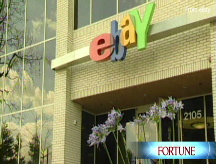eBay's biggest bargain: The company's shares
Investor Daily: With a low stock price and high profit margins, it's time to bid on eBay.
NEW YORK (Fortune) -- Back in 2000, shares of eBay, best known for its online auctions, hit a price-to-earnings ratio of 2,700, and were the darlings of growth investors everywhere. These days the company's shares have a new valuation about 1/300th of its old peak - its P/E is a lowly 9 based on next year's earnings - and a decidedly different fanbase. Grantham Mayo's Jeremy Grantham, Mason Hawkins of the Longleaf Partners Fund and Ariel Capital's John Rogers all have long-term track records for picking stocks that outperform the market, and all three have recently been buying eBay shares for their clients' portfolios. "This is a classic growth stock at a value price," says Ariel's chief investment officer Charlie Bobrinskoy.
eBay's shares have a compelling value story. Here's the math: At a recent price of $14, the company has a market cap of $18.5 billion. On top of its well-known auction site, eBay (EBAY, Fortune 500) also owns PayPal, the largest processor of Internet transactions, and Skype, which charges customers a cut rate to make their phone calls over the Internet. These two businesses generate $600 million in cash a year. Attach a multiple of 20 (Amazon (AMZN, Fortune 500), eBay's closest competitor, trades at 32 times its cashflow) and PayPal and Skype alone are worth $12 billion. "PayPal is an excellent business in its own right," says Sanford C. Bernstein analyst Jeffrey Lindsay.
What's more, eBay has $3.3 billion in cash on its balance sheet. And eBay also owns a number of smaller businesses such as StubHub, which allows people to buy and sell concert and sports tickets. Add it all up and investors who buy eBay's shares today are nearly getting the company's best-known business for free.
eBay's namesake business has had its issues. But the online retailer still has 49 million visitors a month - about a million more than Amazon - and generates $1 billion in cashflow a year. What's more, items sold on eBay are generally lower priced than the same items on Amazon or at Wal-Mart (WMT, Fortune 500) - probably a good thing in this economy.
New management has been addressing many of the Web site's long-time customer complaints. In the past year, the company has pledged that PayPal would refund money from fraudulent transactions, expanded its customer service efforts, and changed its fee structure to encourage sellers to list their items with a "Buy It Now" option for buyers who don't like auctions.
Some investors worry about eBay's recent purchase of Bill Me Later. But the online lender has had half the losses of other credit card companies, and it generates higher fees per transaction then either PayPal or eBay. The acquisition won't contribute to eBay's bottom line in the next few years, but down the road, especially after the credit crunch is over, those higher fees should boost eBay's profit margins, which are already far higher than Amazon's. "This is a $30 stock," says money manager Nick Calamos. "It's extremely cheap."
Looking for guidance in navigating these choppy markets? Let us know which topics you'd like us to cover and we'll try to address your questions in an upcoming Investor Daily. Please note: Fortune cannot give personalized advice on specific investments in your portfolio. ![]()
-
 The retail giant tops the Fortune 500 for the second year in a row. Who else made the list? More
The retail giant tops the Fortune 500 for the second year in a row. Who else made the list? More -
 This group of companies is all about social networking to connect with their customers. More
This group of companies is all about social networking to connect with their customers. More -
 The fight over the cholesterol medication is keeping a generic version from hitting the market. More
The fight over the cholesterol medication is keeping a generic version from hitting the market. More -
 Bin Laden may be dead, but the terrorist group he led doesn't need his money. More
Bin Laden may be dead, but the terrorist group he led doesn't need his money. More -
 U.S. real estate might be a mess, but in other parts of the world, home prices are jumping. More
U.S. real estate might be a mess, but in other parts of the world, home prices are jumping. More -
 Libya's output is a fraction of global production, but it's crucial to the nation's economy. More
Libya's output is a fraction of global production, but it's crucial to the nation's economy. More -
 Once rates start to rise, things could get ugly fast for our neighbors to the north. More
Once rates start to rise, things could get ugly fast for our neighbors to the north. More








